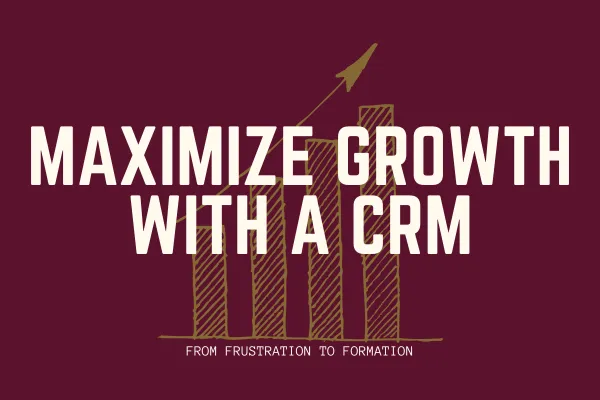
Maximizing Business Growth with Smart CRM Choices: A Velvet Ventures Guide
In the digital age, Customer Relationship Management (CRM) systems have become the backbone of successful businesses. Efficiently managing customer interactions, automating business processes, and enhancing overall productivity are just a few of the advantages that a robust CRM can bring to any enterprise. In our latest episode at Velvet Ventures, we delve deep into the world of CRMs and how they can be the game-changer for your business.
Understanding CRM and Its Impact
CRM is far more than a mere technological tool; it's a comprehensive strategy for managing all your company's relationships and interactions with potential and current customers. This approach goes beyond the simple tracking of customer interactions. It encompasses a holistic understanding of customer needs and behaviors, enabling businesses to build stronger, more meaningful relationships.
By centralizing customer data, CRM systems break down silos within organizations. They create a unified view of the customer across all departments – from sales and marketing to customer service. This centralization is key to delivering personalized experiences. It allows businesses to tailor their interactions based on customer preferences, purchase history, and engagement patterns, fostering a sense of individual attention and care that today's customers crave.
Streamlined communication is another cornerstone benefit of a CRM system. It ensures that all touchpoints with a customer are consistent, relevant, and timely. Whether it's a follow-up email, a marketing campaign, or a service call, CRMs help ensure that the message is coherent and aligned with the customer's stage in the buying journey. This consistency not only improves customer satisfaction but also increases operational efficiency.
But perhaps one of the most transformative aspects of a CRM system is its ability to turn customer data into actionable insights. With advanced analytics and reporting features, businesses can uncover trends, predict customer behavior, and identify opportunities for growth. These insights can drive more effective marketing campaigns, improve sales strategies, and even guide product development. By understanding what customers truly want and how they interact with your business, you can make data-driven decisions that align with their needs and your business objectives.
A well-implemented CRM system empowers businesses to not just react to customer needs, but anticipate them. It enables personalized, proactive engagement that can significantly enhance customer loyalty and advocacy. This forward-thinking approach is what sets apart dynamic, growing businesses in today’s competitive marketplace. With the right CRM strategy, businesses can forge deeper connections, elevate their customer experience, and drive sustainable growth.
Choosing the Right CRM: What to Look For
When embarking on the journey of selecting a CRM for your business, several critical factors demand careful consideration to ensure that the system not only meets your current needs but also adapts and grows alongside your business.
Scalability: One of the primary considerations is scalability. As your business evolves, your CRM should be able to accommodate increased customer data, more complex workflows, and a growing team. A scalable CRM can handle an expanding customer base and increased transaction volumes without compromising performance. This scalability ensures that as your business enters new markets or adds products and services, your CRM can effortlessly scale up to meet these new demands.
Customization: The ability to customize your CRM is vital. Every business has unique processes and customer engagement strategies, and your CRM should be flexible enough to mirror these. Customization can range from simple interface adjustments to complex workflow integrations. The goal is to mold the CRM to fit your business processes, not the other way around. This customization can include creating bespoke fields to capture unique customer data, tailoring dashboards to show relevant metrics, or setting up custom workflows that align with your sales process.
User-Friendliness: User-friendliness is another critical factor. A CRM should be intuitive and easy to navigate, reducing the learning curve for your team. User-friendly CRMs encourage higher adoption rates among staff, ensuring that your investment is fully utilized. It should facilitate a pleasant user experience with a clean interface, logical navigation, and accessible customer support and training resources.
Communication Channels: In today’s interconnected world, a CRM should offer integration with various communication channels. This means not only managing traditional channels like email and phone calls but also integrating with social media platforms, live chat, and other digital communication tools. This integration ensures that you can engage with customers where they are most active, providing a seamless communication experience.
Automation Capabilities: Automation is a game-changer in CRM systems. It allows for the automation of repetitive tasks such as data entry, follow-up emails, or customer notifications. This automation leads to efficiency gains, freeing up your team to focus on more strategic activities. Look for CRMs that offer intelligent automation which can trigger actions based on customer behavior, purchase history, or interaction patterns.
Integration with Business Tools: Finally, consider the CRM’s ability to integrate with other business tools you use. This integration could include marketing automation platforms, financial software, e-commerce systems, or customer service tools. Seamless integration ensures that data flows freely across your business ecosystem, providing a holistic view of customer interactions and business operations. This interconnectedness is crucial for delivering a consistent customer experience and gaining a 360-degree view of your business operations.
Pricing Strategies and Transparency
Navigating the landscape of CRM pricing models can be a complex task, but understanding the nuances of these models is crucial for making an informed decision. Different CRMs come with different pricing structures, and the cost often extends beyond the basic monthly or annual subscription fees.
Total Cost of Ownership: The total cost of ownership (TCO) of a CRM system encompasses more than just the license fee. It includes additional costs like customization, data migration, integration with other systems, user training, and ongoing support and maintenance. When evaluating a CRM, it's essential to consider these ancillary costs to get a complete picture of the investment you're making.
Transparent Pricing: Transparency in pricing is key. A good CRM provider should clearly outline what is included in each pricing tier. Watch out for hidden fees that can come in the form of additional charges for customer support, extra storage, or advanced features. These hidden costs can significantly inflate the overall price, turning what seemed like an affordable solution into a costly endeavor.
Evaluating Business Needs: It's vital to closely evaluate your business needs and match them with the features offered by the CRM. Start by identifying the essential functionalities required to support your business processes. Do you need advanced analytics, marketing automation, or extensive customization capabilities? Not every business will need every feature offered by a CRM platform. Paying for functionalities that you do not need or use can quickly escalate costs without adding value to your business.
Price Point Consideration: Different pricing tiers usually offer varying levels of access to features. Assess the features available at each price point against your business requirements. In some cases, a basic plan may suffice, especially for smaller businesses with simpler processes. However, for larger businesses or those with more complex needs, more advanced plans with broader functionalities might be necessary.
Future Scalability: Consider the scalability of the CRM in relation to its pricing model. As your business grows, will the cost of the CRM scale linearly, or will there be steep jumps in price? A pricing model that scales reasonably with your business growth can offer better long-term value.
Cost-Benefit Analysis: Perform a cost-benefit analysis to determine the return on investment (ROI) that the CRM system promises. This analysis should weigh the operational efficiencies, improved customer relationship management, and potential revenue growth against the total cost of the CRM system.
Integrating CRM into Business Operations
The integration of a Customer Relationship Management (CRM) system into your business is a critical process that can significantly impact your operational efficiency and customer relationships. To ensure a smooth transition and effective utilization, this process should be meticulously planned and executed.
1. Choosing the Right System:
Begin with a thorough assessment of your business needs, considering factors such as the size of your business, the complexity of your sales processes, and customer interaction frequency.
Involve key stakeholders in the decision-making process. This includes representatives from sales, marketing, customer service, and IT departments, ensuring the chosen CRM caters to all functional areas.
Consider future scalability and integration needs. The chosen CRM should not only meet current requirements but also accommodate future growth and technological advancements.
2. Preparing for Transition:
Before implementing a new CRM, prepare your business for the change. This involves setting clear objectives for what you aim to achieve with the CRM and aligning these goals with your overall business strategy.
Conduct a data audit. Identify what data needs to be transferred to the new CRM, cleanse any outdated or inaccurate data, and organize it for easy migration.
3. Data Migration:
Data migration is a critical step in CRM integration. Plan this step carefully to ensure data integrity and security.
Employ tools or services that facilitate seamless data transfer from existing systems to the new CRM. Ensure that data mapping is accurate so that all data fits into the appropriate fields in the new system.
4. Customization and Configuration:
Customize the CRM to fit your unique business processes. This might include custom fields, tailored dashboards, specific sales pipelines, or unique reporting templates.
Configure the system settings to match your business hours, workflow processes, and communication preferences.
5. Training the Team:
Comprehensive training is essential for successful CRM adoption. Develop a training plan that accommodates different learning styles and proficiency levels.
Offer a combination of training methods, including workshops, webinars, and hands-on training sessions. Ensure that the training covers both the technical aspects of the CRM and its strategic application in business processes.
6. Pilot Testing:
Run a pilot test of the CRM with a small, controlled group before full-scale implementation. This helps identify any issues or gaps in the system and training.
Gather feedback from the pilot group and use it to make necessary adjustments.
7. Full Implementation and Ongoing Support:
Once the CRM is fully tested, roll it out across the organization.
Provide ongoing support and resources to ensure continued effective usage. This includes help desks, user guides, and regular training refreshers.
8. Monitoring and Continuous Improvement:
Regularly monitor the use and performance of the CRM. Collect feedback from users and track metrics to gauge the CRM’s impact on business processes.
Continuously improve the system based on user feedback and evolving business needs. This ensures the CRM remains a valuable asset in your business operations.
The Role of CRMs in Marketing and Communication
In the dynamic world of digital marketing, Customer Relationship Management (CRM) systems have emerged as indispensable tools. Their capability to automate and personalize marketing communications revolutionizes how businesses engage with their customers.
1. Personalized Communication:
CRMs enable the segmentation of customer data based on various criteria such as demographics, purchase history, and engagement patterns. This segmentation allows for highly targeted and personalized communication.
Personalization extends beyond addressing customers by name in emails. It encompasses tailoring offers, content, and recommendations to individual preferences, enhancing the relevance and effectiveness of marketing efforts.
2. Customer Journey Mapping:
CRMs provide insights into the customer journey, from initial contact to post-sale interactions. By tracking every touchpoint, businesses gain a comprehensive understanding of the customer experience.
This knowledge enables marketers to identify critical engagement points, optimize the customer journey, and provide timely interventions to enhance the customer experience.
3. Marketing Automation:
Automation is a cornerstone feature of modern CRMs. It allows for the scheduling of marketing campaigns, social media posts, and email sequences without manual intervention.
Automated workflows can trigger specific actions based on customer behavior. For example, an abandoned cart email can be sent automatically if a customer leaves products in their online cart, or a birthday email with a special offer can be scheduled for each customer’s birthday.
4. Enhancing Lead Management:
CRMs streamline lead management by automatically capturing and scoring leads from various channels. This helps prioritize leads based on their likelihood to convert.
Automated follow-ups and nurturing sequences can be set up to keep the leads engaged, increasing the chances of conversion.
5. Measuring Marketing Effectiveness:
With robust analytics and reporting features, CRMs enable marketers to measure the effectiveness of their campaigns. Metrics such as open rates, click-through rates, conversion rates, and ROI are readily available.
These insights allow for data-driven decision-making, enabling continuous optimization of marketing strategies.
6. Integrating with Other Marketing Tools:
CRMs often integrate with other marketing tools like social media platforms, email marketing software, and content management systems, creating a cohesive marketing technology stack.
This integration ensures a unified approach to marketing, where all tools work in synergy, providing a seamless experience both for the marketing team and the customers.
7. Encouraging Creativity and Strategic Thinking:
By automating repetitive and time-consuming tasks, CRMs free up marketers to focus on more creative and strategic aspects of marketing.
This shift from operational tasks to creative thinking fosters innovation in marketing campaigns and strategies, leading to more engaging and successful marketing initiatives.
Real-Life Success Stories from Velvet Ventures
In today’s fast-paced business environment, the strategic implementation of a CRM system can be a catalyst for remarkable transformation. At Velvet Ventures, our experience with a diverse range of clients has provided us with unique insights into the transformative potential of a well-selected CRM. We've observed businesses, small and large, leveraging CRM tools to not only streamline their operations but also to achieve significant growth and efficiency.
1. Case Studies of CRM-Driven Growth:
Our clients' experiences serve as compelling case studies. One notable example is a small e-commerce business that, after integrating a CRM, saw a 37% increase in net growth within just a few months. This growth was attributed to improved sales processes, enhanced customer service, and more effective marketing campaigns, all facilitated by the CRM.
Another client, a service-based company, used CRM data analytics to identify new market opportunities, leading to an expansion of services and a substantial increase in customer base.
2. Improved Customer Retention and Satisfaction:
A key benefit of CRM implementation has been in the area of customer retention. By providing tools to track customer interactions and feedback, businesses have been able to anticipate customer needs more effectively, offer timely solutions, and build stronger, more loyal relationships.
Enhanced customer satisfaction is another frequent outcome, as CRMs help businesses provide more personalized and efficient service, a factor that has become increasingly important in today’s competitive market.
3. Streamlining Operations and Increasing Efficiency:
The automation capabilities of CRMs have allowed businesses to reduce manual labor and errors, particularly in areas like data entry, lead tracking, and customer follow-ups. This efficiency gain has not only reduced operational costs but also allowed teams to redirect their focus towards more strategic tasks.
For businesses with sales teams, CRMs have transformed sales processes by providing better lead management, sales forecasting, and pipeline visibility, leading to increased sales productivity.
4. Data-Driven Decision Making:
With the comprehensive data analytics provided by CRMs, businesses have been able to make more informed decisions. From understanding customer buying patterns to measuring the ROI of marketing campaigns, this data-driven approach has led to more effective strategies and business growth.
Real-time reporting and dashboards have provided business owners and managers with the insights needed to make quick, informed decisions that align with their business objectives.
5. Expanding Marketing Reach and Impact:
CRMs have also revolutionized the marketing efforts of many businesses. By segmenting customers and personalizing marketing messages, companies have been able to increase the effectiveness of their marketing campaigns significantly.
The integration of social media and other digital channels into CRMs has enabled businesses to broaden their reach and engage with customers more dynamically and interactively.
Making the Most of Your CRM
To fully leverage your CRM, dive into its advanced features. Use data analytics for informed decision-making and explore all functionalities to automate as many processes as possible. Remember, the more you put into your CRM, the more you'll get out of it.
The right CRM system is a powerful asset for any business looking to enhance efficiency, improve customer relationships, and drive growth. With careful selection and implementation, a CRM can revolutionize your business operations. Interested in learning more about how CRMs can transform your business? Listen to our full podcast episode at Velvet Ventures for an in-depth discussion. If you're considering CRM options or need guidance, don't hesitate to reach out for a consultation. Let's harness the power of CRM to propel your business to new heights.

© 2026 Velvet Ventures - All Rights Reserved.
velvetventurespodcast@gmail.com
